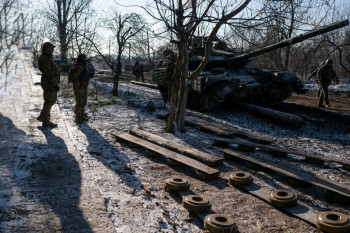Using poorly-trained mobilized soldiers to replenish battle-damaged units is unlikely to help Russia in its large-scale offensives or rapid advance attempts, the Institute of the Study of War said in its latest update.
"Russia’s continued reliance on mobilized men who were unable to perform military tasks such as identifying and detecting minefields or knowing what to do having blundered into them during the assault indicates that these mobilized elements do not have the necessary combat experience necessary to stage a successful mechanized offensive," the ISW wrote.
The mobilized soldiers have "likely received limited individual training and lack the unit cohesion and professional training or experience necessary" for large-scale offensives.
Russia's recent failures in Vuhledar, a town that sits about 150 kilometers southwest of Bakhmut, points to the poor training of the newly mobilized Russian soldiers, the ISW said earlier on Feb. 10.
Oleksii Dmytrashkivskyi, head of the press center of the Tavriskiy District of Ukrainian defense forces, said on Feb. 13 that Russia would have to replace the 155th Naval Infantry Brigade for the third time due to its losses in Vuhledar and previous military failures around Kyiv Oblast and Pavlivka, Donetsk Oblast, the ISW reported.
According to Dmytrashkivskyi, the 155th Naval Infantry Brigade had 5,000 servicemen prior to its defeat in Vuhledar.
The ISW also cited a Russian serviceman from the 155th Naval Infantry Brigade who participated in an assault on Vuhledar as having told a Russian opposition news outlet that the brigade was "80% to 90% staffed with mobilized men because the Russian military command consistently reinforces Russian units with mobilized servicemen."
While Russia could deploy additional mobilized units that are able to conduct sound operations around Vuhledar, the likelihood that these soldiers become effective, cohesive units capable of conducting successful offensives in the near future remains low.












